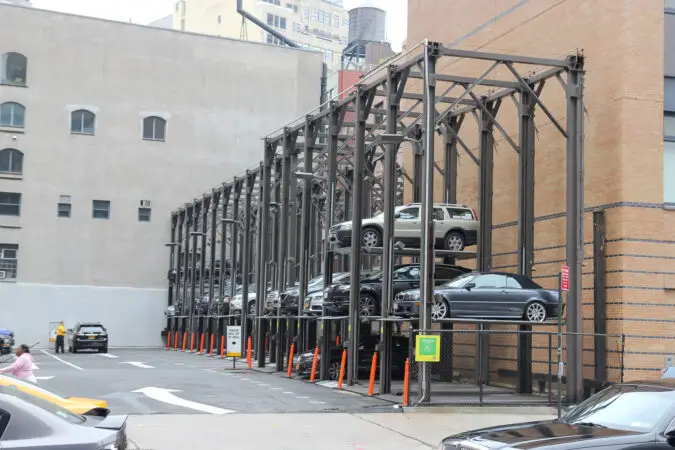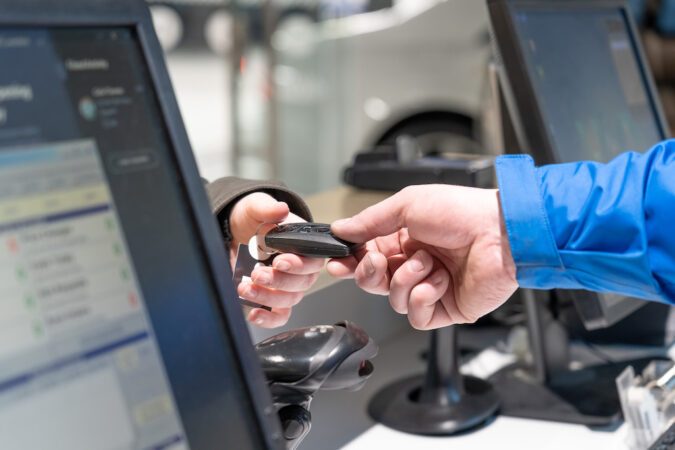Trying to buy a car is a significant challenge in itself, especially with today’s sky-high market prices. It doesn’t just require you to find the right car… Oh no, that’s just the tip of the iceberg. There’s all that paperwork and red tape, not to mention assessing the vehicle’s condition and worst of all – having to haggle for a good deal with the dealer. Perhaps then, you might consider hiring an auto broker.
What now… Who? We’ve heard of car salesmen and dealerships before, but who or what is an auto broker, precisely? To keep things short and sweet, an auto broker is someone who buys that car for you. Imagine this scenario – you want to buy a car, but either don’t want to go through the arduous process of getting it, or you just need a helping hand in trying to find that car, in the first place.
Well, no problem, just call an auto broker! They’re the middleman between you and the dealer. You essentially tell them what sort of car you want and how much is your budget. Once that’s sorted, an auto broker will partake in a scavenger hunt to find a fitting vehicle, get all the documentation done, as well as negotiate the prices down on your behalf. Nevertheless, is it worth getting an auto broker?
Auto Broker
First off, what is an auto broker, anyway? We’ve already explained the general gist of it, but what is it that they do? As mentioned, auto brokers are people who you can go to if you need help in buying a car. You may call them, meet them in person, or schedule a Zoom meeting. In a face-to-face meeting with them, and after explaining that you want them to find you a car, they’ll inquire about things like:
- What is the make, model, trim, or special variant of this car that you want to buy?
- How large or small is your budget to acquire this car (also accounting for their broker fees)?
- What are the specifics of the car in question – trim, color, optional extras, condition, etc.?
- Do you need help with anything else, like transporting your car or getting financing on it?
The more details that you can embellish to an auto broker concerning what car you want to buy, it’ll help to narrow down the search. For example, rather than telling an auto broker, you’d want them to find you a “classic Mustang” (or the famous Gone in 60 Seconds car)… You could tell them to find a “1969 Boss 429 Mustang in Raven Black”. Once an auto broker has all the details that they need, they’ll start hunting for the right vehicle.
Again, the more details you furnish, the easier and quicker the process will be. It’s advantageous for you to get an auto broker, as they have special connections or networks that they could leverage in trying to find the right car. In particular, they’re typically former salesmen themselves. As such, they have plenty of leads on where to find cars and could get better prices or discounts than regular consumers.
Types Of Auto Brokers
Altogether, and as we’ve uncovered so far, auto brokers can help you with:
- Find the right car – type, make, model, or trim – that you’ve desired.
- Get these cars at a better price compared to what regular folks might have access to.
- Haggle and negotiate with dealerships or car salesmen on your behalf.
- Streamlining the paperwork and legal red tape of having that car in your possession.
- Offer you additional services like financing, loans (also, do check out our review of Capital One auto loan rates and what is a good APR for a car), or transporting the vehicle to you.
In general, the upside of hiring an auto broker is that you don’t have to spend days, weeks, or in a select few cases, months or even years to buy a car. You don’t have to scour through car buying sites, public auctions, or forum threads to find that vehicle. Nor, would you need to mentally drain yourself while dealing with the antics of your local car salesmen, or have to haggle them all the way down.
None of which, as I’m sure most of us have experienced before, is at all pleasant. Meanwhile, getting an auto broker could save you all this trouble. Just tell them what you want, and carry on your merry way, as they search high and low for the best deal in town. They do the heavy lifting and go through all that pain so you don’t have to. However, the world of auto brokers themselves is quite complex.
Specifically, there’s more than just one type of auto broker. For the most part, most brokers that you would otherwise encounter just handle the buying of cars. Nonetheless, there are also brokers that’ll provide more specific car-buying services, too. As we’ve hinted earlier, you’ll find brokers that would offer you insurance, transportation, or even financing. So, let’s explore what they all do…
Auto Insurance Broker
The same way an auto broker helps you to find a car, an auto insurance broker will help you to find the right insurance package for your car. Let’s assume that you already have your dream car in your possession. In this instance, you’ll still need to get insurance coverage on top of it. However, just finding the right insurance package is just as dizzying, with a multitude of factors to consider.
For example, you’ll have to think about:
- How much coverage do you want for your car – are you over-insured, or not adequately covered?
- What are the specific terms and conditions that determine the amount of protection you get?
- How much money are you willing to spend on insurance alone, or is there a way to save more?
- What’s the difference between this policy, and that other seemingly similar policies?
- If something changes down the line, how can you adjust your coverage accordingly?
These conundrums are eased if you opt to get an auto insurance broker. They’ll help you shop about for a suitable policy, and determine how much insurance is right for you. After all, you don’t want to under or over-insure yourself… Consequently, getting too little coverage or paying more than what you actually need. To be clear, insurance brokers can’t change or lower the premiums you pay.
That’s been set by the insurance company. However, insurance brokers can assist in finding you any discounts or incentives. Thus, saving you a buck here and there. These insurance brokers are typically compensated by the commissions they get by brokering you an insurance policy. Furthermore, know that while some brokers work with just one insurance company, some broker for multiple brands.
Auto Transport Broker
Ah, but what if you already have a vehicle in your ownership, but need it shipped? Let’s say, you just bought a car from another state, and need it delivered to you… Or, you’re moving away, but have to get your car brought over to your new home. This is where an auto transport broker comes in – or as they’re also otherwise known, a ‘vehicle shipping agent‘. Just like auto brokers, they’re middlemen.
Auto transport brokers aid in laying the groundwork and managing the logistics of transporting a car from A to B. With that said, these transport brokers don’t own a fleet of carrier trucks or haulers that is capable of transporting your car. What they’ll do is brokering a connection between you and vehicle haulage and transportation companies, where they can then pick up and deliver your car.
As with hiring an auto broker, vehicle shipping agents do all the heavy lifting for shipping your car. It means that you don’t have to speak directly to haulage providers, go through all that paperwork, or need to schedule the pick-up and delivery. They usually have extensive relationships with freight and haulage companies, and in some cases, they can even get you cheaper shipping prices, as well.
Thus, the benefits of hiring transport brokers include:
- Since they have close ties with various transportation providers, they’re able to ideally arrange the shipping. They’ll consider factors like where you live, or how many cars you’re shipping.
- Through active bidding for contracts, they could get often net you cheaper shipping prices compared to directly working with a haulage company.
- Brokers could ease the intricacies of shipping your car by keeping you up to date on its location. Or, they could offer to re-schedule the shipping or help pick the car up.
Auto Lease Broker
One of the key hurdles when buying a car is being able to afford it. As you might imagine, not every person has enough cash to purchase a vehicle outright. Hence, why most folks choose to have a car purchased through financing. But as we’ve explored thus far, this too is quite a complex rabbit hole, as finding the ideal loan package for your car is tricky. Furthermore, it’s often a tedious process.
Let’s say you’re trying to buy a car, and want to finance it. You have the option of getting it financed by the dealership. This is pretty simple and can be applied on the spot. But, what if their rates aren’t good enough, or have some odd caveats that you don’t like? If so, you have the option of going to a bank or lender and applying for one of their loans, instead. Their loans might be more attractive.
If you’re shopping around between different lenders, this gets really tiring, as they each require you to apply individually. This means going to each lender, filling in a form, and waiting to see if they’re even willing to accept you. This is where an auto lease broker – aka an auto loan broker – comes in. Just like insurance or transport brokers, lease brokers partner up with a wide variety of lenders.
As such, a car buyer – like yourself – can ask them to find the perfect financing package for you. You would only need to refer to just them, instead of having to go through separate lenders. They act as the middlemen between you and the banks and compare loan offers to see which is more fitting for your needs. Or, if you have bad credit, and are unable to get a good deal from the lender directly.
Broker Vs Dealer
One of the most common misconceptions is that an auto broker is the same as a car dealer. Though the end result is the same (i.e. you get a car), there are significant differences between each one. In particular, an auto broker is a middleman between you and a car dealership. They don’t own any vehicles to sell. Rather, they connect you with the dealers that might have what you’re looking for.
While they’re doing that, auto brokers can find you a car at the best prices, while also helping you to negotiate and haggle with a dealer. Speaking of, auto dealerships are the old-school way of buying a car. You head into a dealership lot or showroom, find the car you want, and let them offer you what deals or financing packages they might have. As for the haggling, you’ll have to handle it yourself.
Although auto brokers can be beneficial in a lot of ways, they’re not necessarily the be-all and end-all if you need to buy a car. For most, it might still be worth it to just accept some of the inconveniences that come with shopping from a dealer, instead. Just so you’d have a better perspective on who to go for, here’s a rundown on the pros and cons of an auto broker vs dealer:
Pros With Auto Broker
- Independence – Brokers are commonly independent of any single automaker or dealership network. As a result, they don’t hold any biases about what cars might be suitable. Nor, would they be forced to meet specific sales targets set unto them.
- Networking – Auto brokers tend to build relationships with a wide network of dealerships and brands. These connections make it easy for them to find whatever car you need. All the while, comparing the prices offered between dealers, and are able to offer you the best deals.
- Variety – Once again, brokers aren’t tied to any single car brand. This affords them the flexibility to recommend or find you cars across a large suite of automakers. Not happy with a Chevy? Then, an auto broker would be more than happy to find a Ford for you, instead.
- Convenience – After you’ve contracted a broker to scour around for a suitable car, you needn’t do anything else. Just kick back and relax while your broker does much of the hunting. Only after they have the car, would you need to come down and test drive it and get the paperwork in order.
- Discounts – Unlike regular consumers, brokers can access fleet discounts and other incentives that we’re unable to get. This is how brokers could offer lower prices compared to what a dealer might offer you if it was done directly. Plus, brokers could also help with negotiating the final price.
- Services – Besides just buying a car for you, brokers can sometimes offer additional services that a dealer might not have. For instance, some brokerage providers can help to compare and suggest insurance policies for you. Or, organize your car to be shipped and transported over to you.
Cons With Auto Brokers
- Trustworthiness – Many brokers out there are legit, reputable, and honest people, who are keen on having you as their No.1 priority. However, you also run the risk of hiring a dishonest and unreliable auto broker. Therefore, it’s a good idea to do a bit of research on that broker before hiring them.
- Fees – Most brokers are upfront about what fees they may charge for their services. For all that they can save you in the long run, it’s typically worth it. Although, there are brokers out there that’ll only reveal all the hidden fees that they’ve been hiding after you’ve bought the car.
- Accessibility – A good auto broker should have expansive networking with various dealers, auto brands, or lenders to finance your purchase. Unfortunately, newer brokers with minimal experience are often limited to how many connections they might have. Thus, limiting your options severely.
- Experience – When looking for a broker, it’s a good idea to run some checks to make sure that they have the right knowledge to help you out. Preferably, you should avoid “bedroom brokers” that’ll mainly work from home. With limited exposure and experience, they’re not always reliable.
Pros With Car Dealerships
- In-Person – With a broker, you only get to see the car in the metal after they’ve arranged for a test drive. However, going to a dealer in-person grants you a lot more time to be around that car. You could see for yourself, in the flesh, how it looks like, what colors are available, and so on.
- Incentives – When new cars enter the dealership lot, they’ll usually put large mark-downs and other retail discounts to clear out their old stock. If you get there in time, you can leverage their discounts (which even brokers sometimes can’t access) to get a car for cheap.
- Charges – Though brokers are able to save you a lot of money, some brokerage providers are pretty costly. Their admin fees can sometimes negate any savings that you might get from the car itself. A dealership, on the other hand, won’t charge you any admin fees when buying a car.
- Time – Brokers are convenient in that you don’t have to go around looking for a car. On the flip side, they commonly take a while to find the right one. With a dealer, everything you’re going to need is there – cars, staff, paperwork. If you need a car right away, you could even get it done under a day.
- Conversations – Yes, we know that a lot of you probably don’t like talking to car salesmen. But others do, and brokers usually only speak with you over the phone, via video calls, or through email. When you want to speak to a person face-to-face, dealerships would always allow you to do that.
Cons With Car Dealerships
- Diversity – Unlike brokers, dealerships usually offer cars only from one brand. Or, a few brands under the same corporate umbrella. Regardless, their selections are typically very limited, which locks you out of comparing against other companies. That’s unless you’re already set on that automaker.
- Bias – When a dealership salesman talks about their cars assume that there’s some bias sprinkled in. Their job is to keep pushing cars out of their forecourts, and they won’t get there by telling you how other brands might offer a better car. In a way, you may never get an honest opinion on a car.
- Financing – Independent brokers often syndicate themselves with a huge selection of financing and loan offers from various lenders. Meanwhile, dealers usually only offer their own financing packages, which don’t always have the best rates. This is also bad news for anyone with bad credit.
Are Auto Brokers Worth It
Before we sum up our discussion on auto brokers, there’s something that we’ve yet to discuss – how much do they charge for their services? For all their conveniences, they sure do alleviate a lot of the headaches and mental drains that are typical when trying to buy a car. Plus, their connections and negotiating skills can sometimes save you thousands of dollars on a car. But are they worth it?
Well, auto brokers commonly make money in one of two ways:
- Flat Fee – Regardless of the work that lies ahead, they’ll charge a flat fee. Typically, auto brokers will charge you somewhere between $200 to $1,000 (or $400 as a market average) to get a car.
- Percentage – Otherwise, they could instead bill you a percentage of how much you’re able to save by going through them, instead of buying the car directly at its advertised MSRP.
With that in mind, it’s up to you to decide if an auto broker is worthwhile. For most people, it’s much easier to just head down to a local dealer and get a car through them. Nonetheless, auto brokers are perfect if you need to find a rare or special car. In short, something that’s not as easily acquired. This could be a great way to have someone else (i.e. the broker) do all that exhaustive searching, instead.
Auto Broker Facts: What You Need to Know Before Hiring One
- An auto broker is a professional who helps buyers find and purchase the vehicle they want, and the buyer pays the broker.
- Providing specific details about the type of vehicle you want will help the auto broker narrow down the options.
- Auto brokers usually charge a flat rate, which ranges from $400 to $800 on average.
- Buyers can save money by helping with the car buying process and searching for the vehicle they want.
- Hiring an auto broker can save time and reduce the effort required to search for a vehicle, as brokers have established relationships with car dealers.
- Auto brokers provide a no-hassle, stress-free buying experience that minimizes the need to negotiate and haggle.
- Anyone ready to purchase a vehicle can hire and use an auto broker, and some brokers also work with entire fleets for corporations.
- When hiring an auto broker, it’s essential to research the options and ensure they are transparent about their fees.
- While using an auto broker is not an absolute necessity, it can provide several benefits, including saving time and money and receiving preferential treatment during the buying process.
- Ultimately, whether to hire an auto broker depends on the buyer’s preferences and needs.
Frequently Asked Questions
Here are some popular FAQs:
What Is An Auto Broker
An auto broker acts as a middleman between you and a car dealer. Typically, buying a car would ask that you physically visit a dealership and speak to a salesperson about what might be suitable. However, an auto broker could instead do this on your behalf, by shopping around to find the right car for you.
What Does An Auto Broker Do
Owing to their close connections with dealerships, auto brokers are able to save you a lot of time and money over the long run. They’ll try to find the right car for you, and set a deal with the dealers. That involves getting access to discounts that you normally can’t and negotiating the pricing even further.
How Much Does An Auto Broker Make
Auto brokers often charge for their services with a flat fee. Usually, this is somewhere around $200 to $1,000 for their time and efforts in helping you to find and buy a car. Otherwise, they’d try to bill you a percentage of how much you’d be able to save on a car had you instead bought it at the MSRP.
How To Become An Auto Broker
To become an auto broker, you’ll first need a license. In California, for example, you can get an auto broker endorsement if you have a retail dealer’s license. This means having to fill in a few forms, as well as complying with any requirements set by the DMV, such as brokering agreements, and so on.
How To Get An Auto Broker License
In most states, getting an auto broker license requires you to fill out an application. This would include a business plan on how you’d attain funding, as well as a background and financial history check. It’ll also require you to get a business license in some places, in addition to a trading name, among others.




